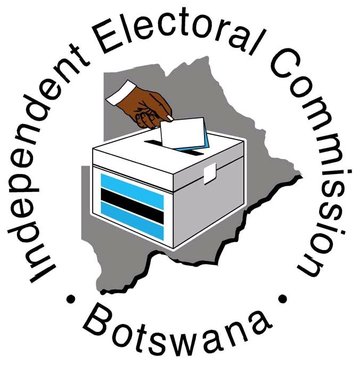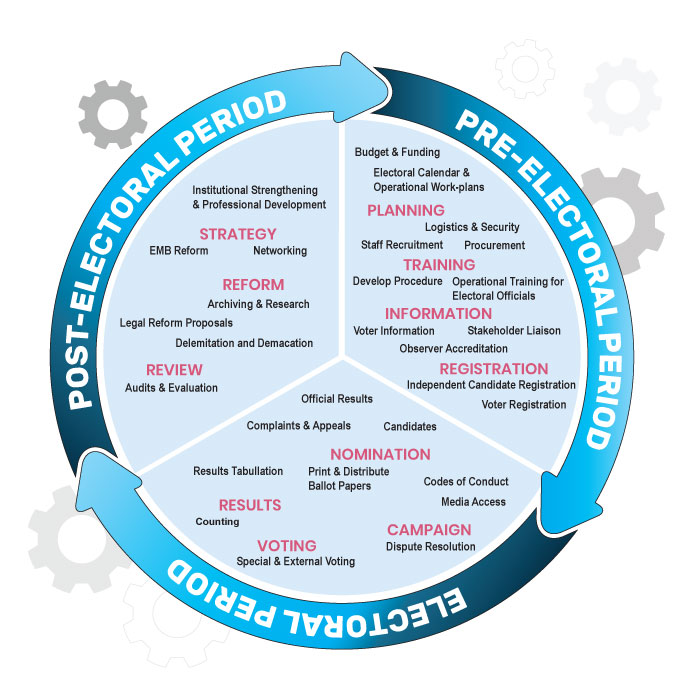The Electoral Process
The Constitution of Botswana gives all citizens who are eighteen (18) years and above the fundamental right to participate in the electoral process of electing members of the National Assembly, the Local Government and voting in a Referendum. In addition to the eligible voting age, the voter should have a valid National Identity Card and Voter Registration Card to vote on election day. The process allows voters to vote only at a polling station in which they registered. The legal framework obligates the Electoral Management Body to publish voters’ rolls for inspection.
General Elections
General elections are held every five years after the expiry of one life of Parliament. Ordinarily Parliament dissolves on the 5th year giving way for holding of general elections. National Assembly and Local Government elections are held in one day. Elections are conducted in accordance with the established electoral legal framework of Botswana and internationally recognised principles and standards.The First-Past-The-Post (FPTP) majority system is used in both the National Assembly and Local Government elections.
The legislations of Botswana do not provide for direct presidential election. However, Presidential Elections(Supplementary Provisions Act) regulates presidential nominations conducted by the Chief Justice.

TYPES OF ELECTIONS
Parliamentary
The country is divided into Fifty-Seven (57) constituencies and each constituency returns one member of the National Assembly. Voters choose from a list of candidates from different political parties and independent candidates through the principle of “one person one vote”. A party with majority of seats, forms a government. Whenever a vacancy occurs, the President issues a Writ setting the date for the election.
Local Government
The Fifty-Seven constituencies have been demarcated into Four Hundred and Ninety (490) polling districts. Each polling district returns one member in the same manner as the constituency. Whenever a vacancy occurs, the Minister of Local Government and Rural Development issues an Election Instrument setting the date for the election. The process of electing members of the Local Government during the general elections is done simultaneously with the election of members of the National Assembly.
Referendum
A referendum is an election in which citizens decide whether or not to give Parliament consent to amend the entrenched sections of the Constitution of Botswana. The referendum uses the voters roll and polling stations of the preceding general elections.
Registration of Voters
Registration of voters is a major preparatory phase in the facilitation of elections. It records and validates eligible citizens to participate in the electoral process. Every resident and non-resident citizen of Botswana who is eighteen years and above qualifies to register as a voter. Prior to every general election, voter registration is conducted to produce a new voters roll. Registration is conducted at established polling stations locally and internationally. Registration may also be conducted at the offices of the principal registration officers of all the constituencies.
Eligible citizens are required to produce valid National Identity Card in order to register in accordance with the electoral law. Eligible citizens register at their place of residence. During registration a voter registration card is issued to be presented on election day. Where the voter changes their residence after registration, they may apply for transfer of their registration.
Inspection of rolls by the public
After the rolls have been produced,they are publicised for forty two (42) days in the case of a general roll and twenty one (21) days in the case of supplementary roll for inspection. The process accords registered voters to register objections and correct their details in the rolls. Rolls are kept at all IEC offices and other designated areas for the purpose of inspection.
Effects of illegal registration
Any person who is duly registered as a voter may object to the inclusion of any other name appearing in the voters roll in relation to the constituency in which they are registered. If the objection is upheld the voter is struck off the roll.
Objections are made by filling in Form G, together with a deposit of P10 per name objected to within 42 days of publications for a general roll and 21 days of a supplementary roll.
If the objection is disallowed the objector loses the deposit and may further be ordered to pay the person they objected to an amount not exceeding P500.00.
Lost voter’s card
Lost voter registration card should be reported or taken to the nearest IEC office. Where a voter loses their registration card, they may apply for a duplicate at their nearest IEC office.
NB: It is illegal for any person to keep registration cards which do not belong to them.
Voting Procedure
Voting procedure is in accordance with the provisions of the Electoral Act. A poll is taken by a ballot and every voter who desires to vote presents themselves at the polling station they have registered to vote.
The electoral legislation divides voting procedures into three:-
Advance voting – Poll taken not earlier than fifteen (15) days before the general poll. The poll caters for election officers and police officers who will be on duty on polling day.
Diaspora voting – The poll accords Batswana in the diaspora an opportunity to participate in the electoral process. It is taken at the same time as advance voting. Voters do not vote for members of the Local Authority.
General Voting – The voting takes place locally and eligible and registered citizens participate
How to cast a vote
A person voting outside Botswana (Diaspora voting) shall be issued a ballot paper and envelope with the name of the constituency under which they registered.
During the advance voting, Election officers and police officers are issued with a ballot paper for the National Assembly and an envelope, followed by the Local Government to mark, fold, put it in the envelope and seal it and deposit into a ballot box.
All the votes from advance and diaspora polls are kept sealed until general poll. During counting they are mixed with the general poll votes and counted
Voting Day
Locally voting commences from 0630hours and ends at 1900hours. The voter is issued a ballot paper for Member of the National Assembly.The same applies for Local Government on the same day.
A voter who is incapacitated by blindness or other physical causes from voting is assisted by the presiding officer to cast their vote according to the wishes of the incapacitated voter in the presence of their aide in case of the visually-impaired voter.
Counting and announcement of Results
The winner of the National Assembly and Local Government is determined through simple majority. The candidate who receives most votes wins elections.
As soon as voting closes at 1900 hours, the presiding officer seals the ballot box and transports it to Constituency/Polling District counting centre. The returning officer receives the ballot boxes, verifies ballot papers, mixes them with those from advance and diaspora voting. Counting starts immediately and results are announced per constituency/polling district.



